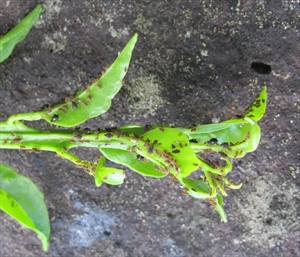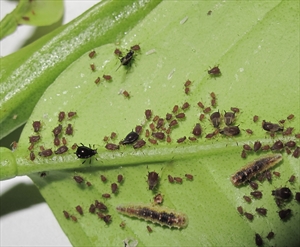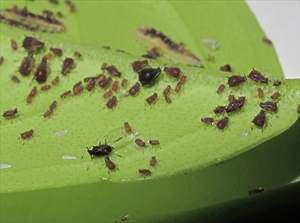NATURAL ENEMIES
Several kinds of natural enemies exist, including parasites, predators and pathogens. These usually keep populations low. The most common are ladybird beetles (adults and larvae), syrphid fly (hoverfly) larvae (Photo 2), lacewing larvae, and tiny parasitic wasps that lay their eggs in the adult aphids. The wasp larvae develop in the aphids eating the inside parts and turning the aphids into empty shells, called 'mummies'.
However, it is not known how good the predators and parasites are in lowering the populations of brown and black citrus aphids and reducing either direct damage or, more importantly, the spread of Citrus tristeza virus.
CULTURAL CONTROL
Not a useful method of managing this aphid.
CHEMICAL CONTROL
If ants are present, kill them with boiling water, without damaging the crop plants, or use synthetic pyrethroids. Without ants, predators and parasites will bring about natural control.
- If insecticides are necessary, use any of the following on aphids:
- White oil (vegetable oil):
- 3 tablespoons (1/3 cup) cooking oil in 4 litres water.
- ½ teaspoon detergent soap.
- Shake well and use.
- Soap:
- Use soap (pure soap, not detergent).
- 5 tablespoons of soap in 4 litres water, OR
- 2 tablespoons of dish washing liquid in 4 litres water.
- Commercial products of horticultural oil contain petroleum oil; follow the instructions on the product label. Make sure the oil can be used on the crops of interest, otherwise, it may damage the foliage.
- These sprays work by blocking the breathing holes of insects causing suffocation and death. Spray the underside of leaves, as the oils must contact the aphids.
Alternatively, use:
- Plant-derived products, such as neem, derris, pyrethrum and chilli (with the addition of soap).
- Note, a variety of Derris, brought many years ago to Solomon Islands from Papua New Guinea, is effective as a spray. It contains rotenone, an insecticide, so it should be used with caution. There may be varieties of Derris (fish poisons) in your country that can be tried.
- Synthetic pyrethroids are likely to be effective against aphids (and also ants), but will kill natural enemies, too.
____________________
When using a pesticide, always wear protective clothing and follow the instructions on the product label, such as dosage, timing of application, and pre-harvest interval. Recommendations will vary with the crop and system of cultivation. Expert advice on the most appropriate pesticides to use should always be sought from local agricultural authorities.






